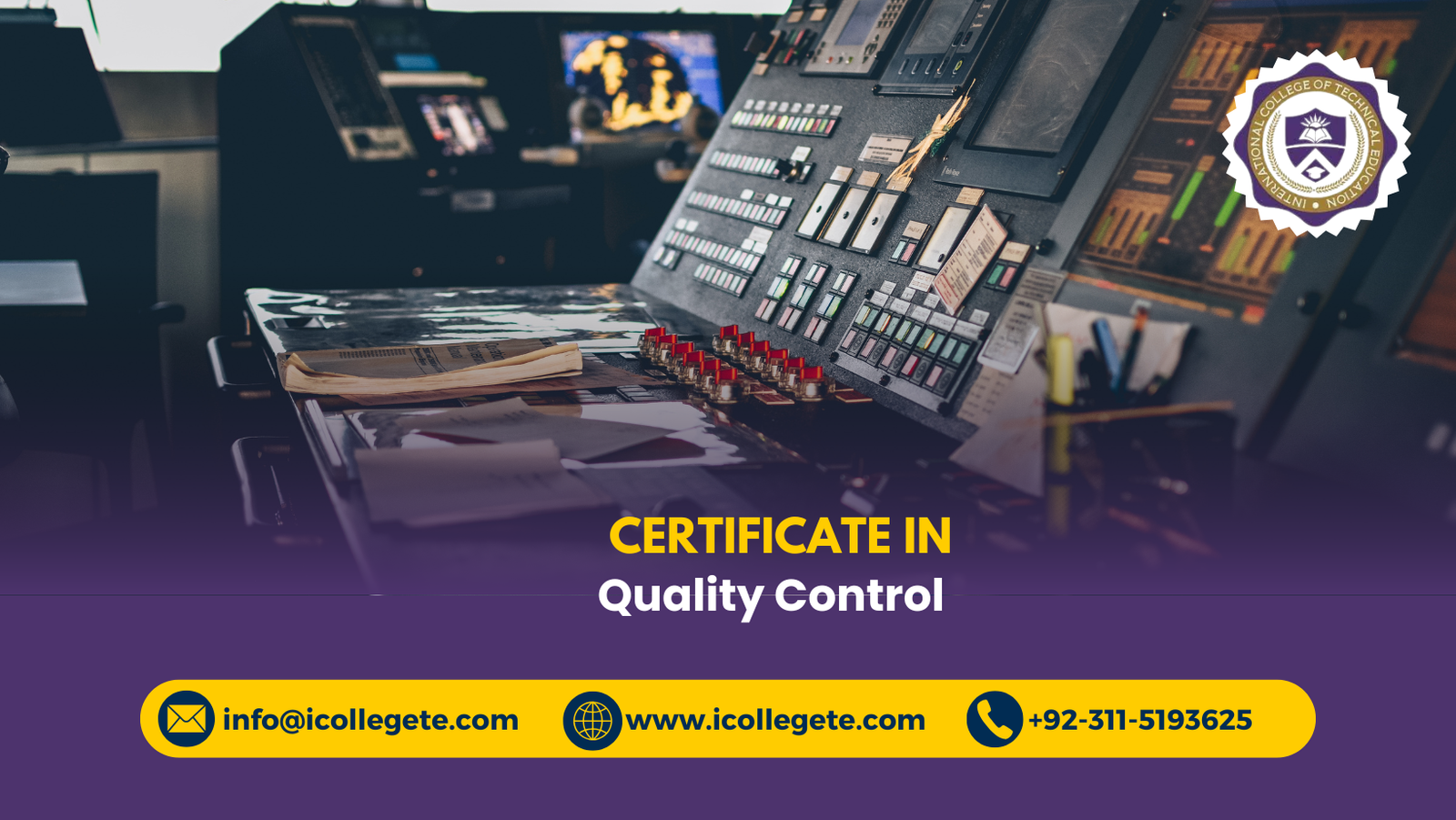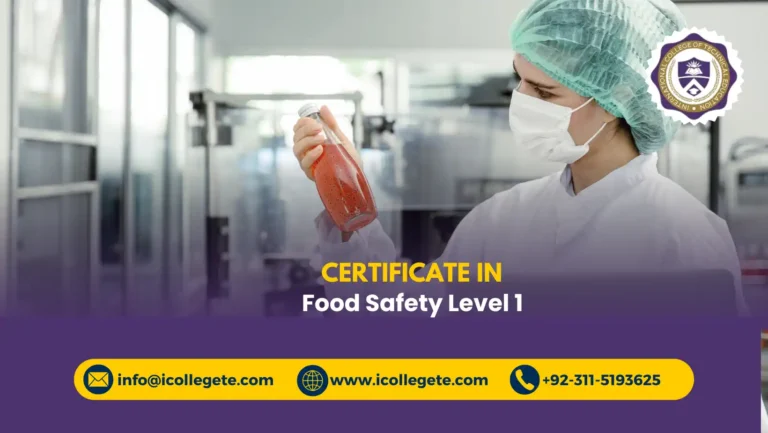In today’s competitive manufacturing and service sectors, maintaining consistent product quality is not just a goal—it’s a necessity. The Quality Control course in Gujrat is designed to equip learners with the essential skills and technical knowledge required to monitor, evaluate, and improve product and process quality across diverse industries. Whether you’re entering the workforce or upgrading your professional profile, Quality Control course in Gujrat offers a practical foundation in quality assurance, inspection techniques, and compliance with national and international standards.
Delivered by leading vocational institutes in Gujrat, a city known for its thriving industrial base, the Quality Control course in Gujrat blends theoretical instruction with hands-on training. Students will explore key topics such as defect analysis, process control, documentation protocols, and the use of modern testing equipment. The curriculum is aligned with industry demands, making Quality Control course in Gujrat ideal for roles in manufacturing, pharmaceuticals, textiles, construction, and engineering.
Graduates of Quality Control course in Gujrat are prepared to take on quality control roles that ensure product reliability, customer satisfaction, and regulatory compliance. With a focus on employability and technical excellence, the Quality Control course in Gujrat opens doors to high-demand careers in both local and international markets. If you’re ready to build a future rooted in precision and performance, Quality Control course in Gujrat offers the tools to make it happen.
Course Overview
The Quality Control Diploma course in Gujrat is a structured six-unit program designed to prepare learners for technical roles in inspection, compliance, and process monitoring across industrial sectors. Quality Control course in Gujrat emphasizes hands-on learning and practical application of quality standards, making it ideal for individuals seeking job-ready skills without requiring prior experience. Each unit focuses on a core area of quality control, including measurement techniques, documentation protocols, defect analysis, and regulatory frameworks.
Learners will gain exposure to real-world tools and procedures used in manufacturing, construction, pharmaceuticals, and engineering environments. The Quality Control course in Gujrat is delivered in Gujrat, a city with growing demand for skilled technicians and quality assurance professionals. With a focus on precision, consistency, and workplace safety, students are trained to identify quality issues, implement corrective actions, and support continuous improvement initiatives. The six-unit format allows for progressive learning, ensuring that each module builds on the last to develop a complete understanding of quality control systems. Quality Control course in Gujrat is an excellent choice for those aiming to enter or advance in technical fields where quality and compliance are critical.
Course Study Units
- Fundamentals of Quality Assurance and Standards
- Inspection Methods and Testing Techniques
- Process Control and Defect Analysis
- Documentation and Compliance Procedures
- Quality Tools and Statistical Techniques
- Workplace Safety and Regulatory Practices
Learning Outcomes for this course
Understanding Quality Standards and Assurance
- Identify key national and international quality standards
- Understand the principles of quality assurance and control systems
- Apply ISO and other compliance frameworks in industrial settings
- Recognize the role of quality in customer satisfaction and product reliability
- Distinguish between quality assurance, quality control, and inspection
- Interpret quality documentation and standard operating procedures
- Evaluate the impact of quality systems on organizational performance
Mastering Inspection and Testing Techniques
- Use basic and advanced inspection tools for product evaluation
- Conduct visual, dimensional, and functional inspections
- Apply destructive and non-destructive testing methods
- Record and interpret inspection results accurately
- Identify defects and classify them according to severity
- Understand calibration procedures and equipment maintenance
- Follow safety protocols during inspection and testing processes
Process Control and Defect Analysis
- Monitor production processes to ensure consistent output
- Analyze root causes of defects using structured methods
- Implement corrective and preventive actions (CAPA)
- Use statistical process control (SPC) tools effectively
- Track process variations and maintain control charts
- Collaborate with production teams to resolve quality issues
- Document and report process deviations professionally
Documentation and Compliance Practices
- Maintain accurate quality records and inspection reports
- Understand audit procedures and compliance documentation
- Prepare checklists and quality control forms for daily use
- Ensure traceability of materials and production batches
- Support internal and external quality audits
- Follow documentation protocols for regulatory compliance
- Use digital tools for recordkeeping and reporting
Application of Quality Tools and Techniques
- Apply tools like Pareto charts, fishbone diagrams, and histograms
- Use cause-and-effect analysis for problem-solving
- Conduct quality improvement projects using PDCA cycle
- Implement 5S and lean principles in quality environments
- Analyze data using basic statistical methods
- Support continuous improvement initiatives in the workplace
- Present findings using visual and written formats
Workplace Safety and Regulatory Awareness
- Understand safety standards relevant to quality control roles
- Identify hazards in inspection and testing environments
- Follow PPE and equipment handling guidelines
- Comply with workplace health and safety regulations
- Participate in safety audits and risk assessments
- Promote a culture of safety and quality in the organization
- Report incidents and near-misses according to protocol
Communication and Professional Conduct
- Communicate inspection results clearly to supervisors and teams
- Collaborate effectively with production and quality departments
- Handle customer feedback and quality complaints professionally
- Maintain ethical standards in quality reporting and analysis
- Demonstrate punctuality, accuracy, and attention to detail
- Adapt to diverse workplace cultures and team dynamics
- Build confidence in presenting quality findings and solutions
Entry Requirements for this course
- Minimum Age Requirement : Applicants must be at least 18 years old at the time of enrollment. This ensures readiness for vocational training and the ability to work in industrial environments.
- Educational Qualification : A minimum of Matric (Grade 10) or equivalent is required. Candidates with Intermediate or technical education backgrounds are also encouraged to apply for better course alignment.
- Work Experience : No prior work experience is required. However, individuals with basic exposure to manufacturing, inspection, or technical trades may find it easier to grasp practical concepts.
- Language Proficiency : Basic understanding of English or Urdu is recommended. This helps learners follow course materials, safety instructions, and communicate effectively in workplace settings.
- Digital Literacy : Applicants should be able to use a smartphone, tablet, or computer. Access to the internet and basic digital skills are essential for completing assignments and using online learning tools.
- Interest in Technical Work : A genuine interest in quality control, inspection, and industrial processes is important. Learners should be motivated to work in detail-oriented and safety-driven environments.
- Availability for Training : Students must be able to attend regular classes and practical sessions. Consistent participation is necessary to complete all six study units successfully.
- Professional Attitude : Applicants should demonstrate discipline, punctuality, and a willingness to follow safety and quality protocols. These traits are essential for success in technical and industrial roles.
Course Benefits of this course
Industry-Relevant Technical Skills
- Learn practical inspection and testing methods used in manufacturing
- Understand quality assurance systems and compliance protocols
- Gain hands-on experience with measuring instruments and tools
- Master defect identification and root cause analysis techniques
- Apply statistical process control in real-world scenarios
- Use documentation and reporting tools for quality audits
- Understand calibration procedures and equipment standards
- Learn to interpret technical drawings and product specifications
- Build confidence in applying quality control procedures independently
Career Opportunities Across Sectors
- Qualify for roles in manufacturing, engineering, and construction
- Explore job openings in pharmaceuticals and food processing industries
- Work in textile and garment quality inspection departments
- Join packaging and logistics companies as QC technicians
- Support quality teams in automotive and electronics sectors
- Apply for roles in government or private testing labs
- Assist in production line monitoring and process improvement
- Gain eligibility for supervisory roles in quality departments
- Build a foundation for long-term career growth in technical fields
Practical Learning and Hands-On Training
- Participate in lab-based sessions and equipment handling
- Practice inspection techniques on real industrial components
- Engage in mock audits and documentation exercises
- Learn through case studies and real-world quality scenarios
- Receive instructor feedback on technical performance
- Use digital tools for quality reporting and analysis
- Apply safety protocols during practical assessments
- Develop teamwork and coordination skills in workshop settings
- Build a portfolio of inspection reports and quality forms
Strong Foundation for Professional Advancement
- Understand the role of quality in business success
- Learn how to support continuous improvement initiatives
- Gain skills that align with ISO and other global standards
- Build credibility as a detail-oriented and reliable technician
- Prepare for advanced certifications in quality management
- Improve employability through recognized vocational training
- Develop leadership traits for future supervisory roles
- Strengthen problem-solving and decision-making abilities
- Position yourself for promotions and technical specialization
Local Relevance with Global Standards
- Study in Gujrat, a hub for industrial and vocational growth
- Learn quality practices used in regional manufacturing units
- Understand local compliance requirements and safety norms
- Apply global standards to improve local product quality
- Connect with industry professionals and guest trainers
- Participate in site visits to nearby factories and labs
- Build networks with employers and technical institutes
- Promote quality awareness in local production environments
- Prepare for both domestic and international job markets
Accessible and Inclusive Learning
- Open to freshers and professionals from diverse backgrounds
- No prior experience required—ideal for beginners
- Course delivered in Urdu and English for better understanding
- Flexible learning formats with practical and theoretical balance
- Supportive instructors with industry experience
- Affordable training with high employability outcomes
- Inclusive environment for male and female learners
- Opportunities for peer learning and group projects
- Guidance available for career planning and job placement
Safety and Compliance Awareness
- Learn workplace safety standards and PPE usage
- Understand regulatory requirements for industrial environments
- Apply safety protocols during inspections and testing
- Participate in safety drills and risk assessments
- Recognize hazards and report incidents effectively
- Promote a culture of safety and quality in the workplace
- Support compliance with environmental and health regulations
- Understand ethical responsibilities in quality roles
- Build awareness of legal frameworks in technical operations
Digital and Analytical Competence
- Use basic software for quality documentation and reporting
- Learn digital tools for defect tracking and analysis
- Apply data interpretation skills in quality assessments
- Understand the role of automation in quality control
- Explore mobile apps and online platforms for QC tasks
- Build familiarity with spreadsheets and technical databases
- Present findings using charts, graphs, and visual formats
- Analyze trends and patterns in production data
- Support digital transformation in quality departments
Who Should Enroll in this course
- High School Graduates : Students who have completed Matric or equivalent and want to enter a technical field with strong job prospects.
- Intermediate-Level Students : Learners with FA, FSC, or DAE backgrounds seeking vocational training aligned with industrial careers.
- Freshers Exploring Technical Careers : Individuals with no prior experience who want to start a career in manufacturing, inspection, or process control.
- Factory and Production Workers : Employees in industrial settings who want to upgrade their skills and qualify for quality control roles.
- Technicians and Machine Operators : Workers handling machinery or production lines who need formal training in inspection and defect analysis.
- Construction Site Staff : Individuals involved in construction projects who want to learn quality standards and compliance procedures.
- Pharmaceutical and Food Industry Workers : Staff working in regulated environments who need to understand documentation and safety protocols.
- Textile and Garment Inspectors : Professionals in textile units who want to improve their inspection techniques and reporting accuracy.
- Engineering Diploma Holders : DAE graduates looking to specialize in quality control for mechanical, electrical, or civil engineering sectors.
- Job Seekers in Technical Fields : Unemployed individuals aiming to build employable skills for industrial and manufacturing roles.
- Supervisors and Line Managers : Team leaders who want to understand quality systems and improve production outcomes.
- Safety and Compliance Officers : Personnel responsible for workplace safety who need to integrate quality control into their protocols.
- Vocational Training Enthusiasts : Learners passionate about hands-on education and practical skill development.
- Women Entering Technical Trades : Female candidates seeking inclusive, skill-based training for industrial careers.
- Entrepreneurs in Manufacturing: Small business owners who want to implement quality control systems in their production units.
- Freelancers and Consultants: Independent professionals offering inspection or compliance services to local industries.
- Interns and Apprentices: Young professionals in training programs who want to specialize in quality assurance.
- Career Changers: Individuals from non-technical backgrounds looking to transition into industrial or technical roles.
- Community Development Workers: People promoting vocational education and industrial growth in their local areas.
- Anyone Interested in Industrial Precision: Motivated learners who value accuracy, safety, and quality in technical environments.
Future Progression of this course
Progression to Advanced Diplomas and Certifications
- Enroll in Level 6 Advanced Diploma in Quality Management
- Pursue specialized diplomas in industrial inspection or testing
- Join certification programs in ISO standards and auditing
- Take short courses in Six Sigma, Lean Manufacturing, or 5S
- Explore advanced training in statistical process control (SPC)
- Attend workshops on quality documentation and compliance
- Complete certifications in workplace safety and risk assessment
- Upgrade skills through vocational diplomas in engineering support
Entry into Technical and Supervisory Roles
- Apply for roles as Quality Control Inspector or Technician
- Work as a Process Monitoring Assistant in manufacturing units
- Join production teams as a Quality Assurance Coordinator
- Support compliance departments in documentation and audits
- Assist in calibration and equipment maintenance roles
- Progress to shift supervisor or team leader positions
- Take on roles in packaging, labeling, and final product checks
- Contribute to internal quality improvement initiatives
Sector-Specific Career Expansion
- Enter pharmaceutical and food industries as QC staff
- Work in textile and garment inspection departments
- Join construction firms for material and site quality checks
- Support automotive and electronics manufacturing units
- Apply for roles in government or private testing labs
- Assist in logistics and warehouse quality operations
- Contribute to export compliance and product certification
- Explore roles in packaging and labeling quality assurance
Entrepreneurship and Freelance Opportunities
- Start a small-scale inspection or testing service
- Offer freelance quality audits for local manufacturers
- Provide documentation and compliance support to SMEs
- Launch a consultancy for ISO and safety standard implementation
- Develop training modules for vocational institutes
- Partner with factories for outsourced QC services
- Create digital tools or templates for quality reporting
- Build a brand around industrial quality and safety solutions
Continued Skill Development
- Learn advanced data analysis for quality metrics
- Take courses in digital documentation and reporting tools
- Study workplace ethics and professional conduct in QC
- Explore automation and AI tools in quality inspection
- Attend seminars on global quality trends and innovations
- Build soft skills for leadership and team coordination
- Join online platforms for technical skill enhancement
- Participate in industry-specific webinars and forums
Regional and National Career Mobility
- Apply for QC roles in major industrial cities across Pakistan
- Join provincial quality assurance programs and initiatives
- Work with regional training centers as a QC instructor
- Support local manufacturing clusters with compliance services
- Collaborate with government bodies on quality campaigns
- Contribute to vocational education and skill development projects
- Explore job opportunities in export zones and industrial parks
- Build networks with national quality and safety associations
Pathways to Vocational Degrees
- Progress to vocational bachelor’s programs in industrial technology
- Enroll in applied degrees focused on manufacturing and operations
- Join diploma-to-degree pathways with technical universities
- Study business operations with a focus on quality systems
- Access credit transfer options for further education
- Combine QC training with entrepreneurship or logistics modules
- Explore distance learning degrees in industrial management
- Build academic credentials for future specialization
International Exposure and Seasonal Work
- Apply for seasonal QC roles in international manufacturing hubs
- Join overseas training programs in quality and compliance
- Collaborate with foreign firms on product testing and audits
- Participate in international trade fairs and technical expos
- Explore job opportunities in global supply chain operations
- Work with export-oriented companies on quality documentation
- Gain experience through internships with multinational firms
- Build a portfolio for international job applications and certifications
Conclusion
The Quality Control Diploma course in Gujrat offers more than technical training—Quality Control course in Gujrat fosters a mindset of precision, accountability, and continuous improvement. In industries where even the smallest error can lead to major setbacks, professionals who understand the value of consistency and compliance are indispensable. Quality Control course in Gujrat encourages learners to think critically, act responsibly, and contribute meaningfully to operational excellence. It’s not just about inspecting products; it’s about shaping systems that prevent defects, protect reputations, and elevate standards.
Gujrat’s industrial landscape provides a practical backdrop for learners to engage with real-world challenges and build confidence in their roles. The Quality Control course in Gujrat also cultivates soft skills like communication, teamwork, and ethical decision-making—qualities that are often overlooked but essential in quality-focused environments. Whether learners aim to work locally or expand into broader markets, Quality Control course in Gujrat equips them with a professional identity rooted in diligence and reliability. For those who value accuracy and aspire to make a measurable impact in technical fields, this course offers a clear, structured path forward—one that begins with detail and leads to distinction.
Take the Next Step Toward Quality Control course in Gujrat – Enroll Now





